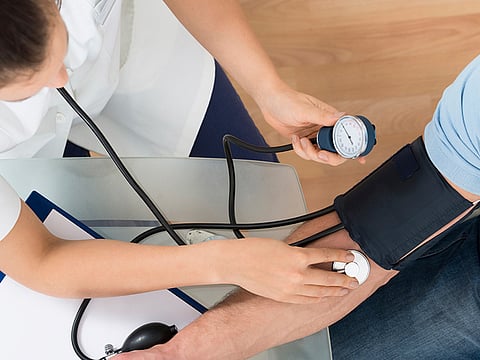Hypertension patients can fast during Ramadan
Taking medication on time and observing basic precautions can help high blood pressure patients to fast successfully

Dubai: This Ramadan, many people newly diagnosed with diabetes and hypertension or high blood pressure, will be keeping the fast and it is important for them to be informed on the dos and don’ts.
A reiteration of the essential facts can come in handy even for those who have these long-standing chronic conditions and have been keeping the fast.
According to specialists, with a proper medication routine and the right precautions, high blood pressure patients can keep a fast.
But first they must consult with their doctor.
Dr Wiam Seddiqi Hussain Al Sharif, general practitioner – Internal Medicine at Prince Medical Centre, Dubai, said, “Most studies to date indicate that people with mild to moderate hypertension, that is stable and well-controlled on oral antihypertensive agents administered once or twice [a day], can generally fast without any major problems. However, those with uncontrolled hypertension or complex regimen involving multiple medications taken throughout the day should refrain from fasting as it poses a major health threat.”
He advised patients to check their blood pressure in the morning after Fajr prayers, and before iftar and, if they find it going beyond control, they need to take medication. It takes some time for patients to acclimatise themselves to the new routine and until then they need to be careful, he added.
The change of routine in Ramadan necessitates a look at how it affects the body. The first thing to do is ensure your meal planning is proper, said Dr Al Sharif.
“Changes in eating and sleeping habits can put the body under immense amounts of stress,” he said. “Schedule and plan meals ahead of time to make sure you are able to take in all the necessary nutrients. Stay hydrated, and take proper rest.”
It is important, he said, for people with high blood pressure to consult their doctor and schedule their medications to be taken twice a day, once during suhour and once at iftar. “However, this system is open to change, depending on the patient’s individual needs,” he said.
Another essential rule, he said, is to never skip medication under any circumstances. “And it is highly recommended that [hypertension patients] do some physical exercise every day, such as going for a walk after sundown. However, during the hottest part of the day, stay in cool areas (indoors or in shade) and limit your physical activity. Rest if possible,” he advised.
An important aspect is hydration. Hypertensive patients needs to take care as lack of liquids can make their blood thicker and more prone to clot formation. One of the main indicators of poor hydration is the onset of severe headaches which border on migraines.
Dr Zeeshan Khan, specialist, Internal Medicine at Medeor 24x7 Hospital, Dubai, explained the genesis of these headaches and what one could do the avoid them. “Headaches relating to hypertension occur only if blood pressure rises to more than 180 systolic. These headaches are rare but do monitor your blood pressure during Ramadan and consult with your doctor two to three weeks before to adjust your medication accordingly.
“If there are fluctuations in blood pressure levels during Ramadan, do not delay seeking medical advice,” he added. “Some people may also experience an increase in their chronic headaches such as migraine,” he said.
Other reasons for headaches during Ramadan, Dr Khan said, are ”withdrawal of caffeine, hypoglycaemia [low blood sugar], dehydration and the stress of fasting. Headaches usually start around afternoon and become worse by evening and hypertensive patients can take care to gradually ease themselves into the fast and begin preparing their body a couple of days before the onset of Ramadan”.
Headaches usually start around afternoon and become worse by evening and hypertensive patients can take care to gradually ease themselves into the fast and begin preparing their body a couple of days before the onset of Ramadan.
Ramadan guidelines for hypertensive patients
1. Consult your doctor and adjust your medication so that you can have two doses a day- one at suhour and another at iftar.
2. Reduce caffeine intake.
3. Have one strong cup of tea or coffee at suhour to prevent withdrawal headaches.
4. Have low-sugar and soluble-fibre foods such as oats at suhour as this will help prevent headaches related to hypoglycaemia.
5. Make sure to drink at least 8 glasses of water between Iftar and suhour and break your fast with a refreshing drink.
6. Get adequate sleep at night.
7. Avoid excess exposure to the sun. Rest as much as you can, do not take on extra stress during fasting hours.
8. Check your blood pressure after suhour, once during the day and once at iftar and maintain a record.
9. Get light to moderate exercise after iftar and before dinner.



